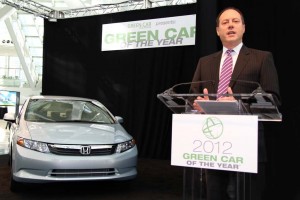
Honda Chief Marketing Officer Mike Accavitti accepts the Green Car of the Year award for the Honda Civic Natural Gas.
Defying conventional wisdom that battery cars are the alternative of choice, the natural gas-powered version of the Honda Civic was named Green Car of the Year during a well-attended ceremony at the L.A. Auto Show.
The Civic was one of the five finalists for the award, sponsored by Green Car Journal. The others were the new Ford Focus Electric, the battery-powered 2012 Mitsubishi i, the 2012 Toyota Prius v, which is a larger version of the world’s best-selling hybrid, and the 2012 Volkswagen Passat TDI diesel.
Though other makers have expressed interest in the relatively clean-burning fuel, Honda has been the only consistent manufacturer of vehicles using natural gas.
“For Honda, ‘blue skies for our children isn’t just a slogan,’ it’s something we believe in,” declared Mike Accavitti, the maker’s North American marketing chief, who accepted the Green Car of the Year award.
Significantly, with Honda’s victory, three of the last four vehicles to win the Green Car of the Year trophy were powered by some firm of internal combustion engines, rather than electric motors. The fourth winner, the Chevrolet Volt, which took honors in 2010, is powered by a plug-in hybrid that uses a large battery pack for daily driving but has a back-up gasoline engine for longer trips.
The choice of the Honda, like the Audi A3 TDI diesel two years before, took some by surprise. But Ron Cogan, publisher of Green Car Journal, stressed that the goal of the jurors was to find both the best technology and the sort of vehicle that will have a real impact on the market – despite what the popular headlines suggest.
Calling “ludicrous” the Obama Administration’s goal of putting 1 million battery cars on the road by 2015, Cogan stressed that “The battery issue has not been resolved. I’m a battery car enthusiast, but as wonderful as they are they don’t fit everyone’s needs.”
Cogan stressed that barring some technological breakthrough, the environmentally friendly cars of the near to mid-term will likely make use of a variety of green, or at least greener, propulsion technologies.
Honda’s Accavitti echoed that, noting his company was an early player in the conventional hybrid segment, unveiled its first battery car at this year’s L.A. Auto Show, and has been marketing hydrogen fuel cell vehicles in Southern California for several years. “We don’t know if the answer is electric or hydrogen or natural gas, so at Honda we’re working on all of them.”
Natural gas has been gaining credibility in recent years, and General Motors recently announced plans to bring out a model of its own. The big challenge, proponents admit, is the lack of a refueling infrastructure. Consumers are most likely to have to set up home filling systems.
And, in fact, the vast majority of buyers are corporate or government fleets that can set up their own systems.
Even so, with the discovery of significant new natural gas resources in the U.S., Accavitti said Honda is optimistic demand will grow. This coming year, the maker plans to double production of the natural gas Civic – though that will only push it to about 2,000 units.
